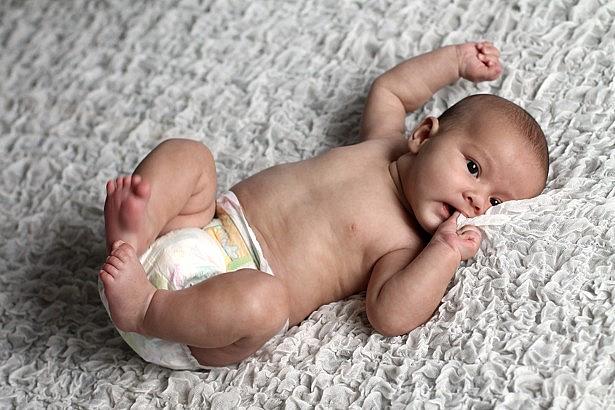The diaper dilemma
Olga Khazan's reporting on parenting and childhood was undertaken as a project for the Fund for Journalism on Child Well-Being and the National Health Journalism Fellowship, programs of the USC Annenberg Center for Health Journalism.
Other stories in her series include:
The Hardest Job: Could you raise four children in a homeless shelter without spanking?

Infants use about 240 diapers per month. A year’s supply of diapers costs $936. That means a single mother mother working full time at the minimum wage can expect to spend 6 percent of her annual pay on Pampers alone.
Meanwhile, the two biggest programs that assist low-income mothers, SNAP (food stamps) and WIC, don’t cover diapers or baby wipes.
That might be why, in a study of 877 pregnant and parenting women published inPediatrics in 2013, a team of researchers found that needing diapers and not being able to buy them was a leading cause of mental health problems among new moms.
For the study, Megan Smith, assistant professor of psychiatry at the Yale School of Medicine, approached women in New Haven, Connecticut, and asked them one simple question:
“If you have children in diapers, do you ever feel that you do not have enough diapers to change them as often as you would like?”
Almost 30 percent of the women responded “yes”—they often lacked sufficient diapers. Their explanations of what they did to “stretch” the diapers reflect the harrowing reasons why so many new moms feel depressed and anxious.
Mothers would take the diapers off, dump out the poop, and put the diapers back on. They would air-dry the diapers. They’d let their kids sit in wet diapers for longer than they should—a practice that can lead to UTIs and other infections. Other moms have reported potty training infants who are less than a year old—at least six months earlier than is recommended—in order to save money.
I learned more about this study during a week-long training with the California Endowment Health Journalism Fellowships, where I am a grantee this year. Smith presented her work to the fellows and described what she’s done to help these mothers. The women told Smith things like, “My self-esteem plummets. I can’t soothe my baby because I can’t put a clean diaper on my baby,” she recalled.
The diaper deficit hurts more than moms’ self-worth: Many daycare centers require a week’s supply of diapers before mothers can enroll their children. Without the required diaper stash, women can’t drop their kids off and look for work.
“An adequate supply of diapers may prove to be a tangible way of reducing parenting stress and increasing parenting sense of competency, enabling parents to be more sensitive with their children, and thereby improving parenting quality and overall child outcomes,” Smith wrote in the study.
Smith now works with the New Haven MOMS Partnership, a support network for new mothers and their children. The Partnership operates several resource centers that offer stress-management classes and job-search help at locations across the city—including in places where moms are already likely to be, like Stop & Shop grocery stores.
The first thing the moms receive when they arrive for counseling? A bundle of fresh diapers.
[This story was originally published by The Atlantic.]

